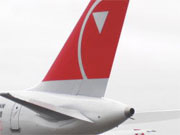September 16, 2005
 |
| A Northwest customer. The airline's money troubles could have an impact on the state's economy, since so many of Minnesota's businesses rely on Northwest service. (MPR Photo/Mark Zdechlik) |
St. Paul, Minn. — When asked what Northwest's bankruptcy filing means for the state, Minnesota's top economic officials warn against overstating the impact. State economist Tom Stinson says outwardly, there may be very little change in Northwest under bankruptcy.
"Given that the story is not that Northwest is going out of business, but that the firm is pausing and restructuring and likely to continue in operations in much the same way as it does now, it's not likely there's going to be much economic fallout statewide," says Stinson.
Stinson says while Northwest is large, it is just a small piece of the overall economic activity in the state.
A recent state analysis found economic activity surrounding Northwest pumps about $4.8 billion a year into the state economy. That's significant, but still only about 1.8 percent of the state's economic output.
Northwest is Minnesota's 11th largest employer, after companies like Target, Wells Fargo, Wal-Mart, and 3M.
But Bob Isaacson, director of economic research for the state, says Northwest does stand out as a high-wage employer. While about 15,000 Minnesotans work for Northwest, their spending and the company's local purchasing support another 38,000 jobs in other industries.
"Because they have high wages, they spend a lot in the economy. So the depth and breadth of their spending is much greater than that of, say, Wal-Mart," says Isaacson.
Those high wages are at stake during bankruptcy. Pilots, for example, know at least 400 jobs will be cut starting in November. The company has recently proposed a 22 percent pay cut. Mechanics, most of whom make an about $70,000 a year, are on strike over Northwest's demands to cut both jobs and wages.
The economic impact of Northwest upon Minnesota also includes the "hub effect." By maintaining its hub in the Twin Cities, Northwest provides more non-stop service than a community this size would normally have.
Former Gov. Arne Carlson was in office in 1991, when Northwest threatened to move its hub without financial assistance from the state. He says some local companies made it clear that if the hub left, so would they.
Carlson says the large number of non-stop flights afforded by the hub are no less valuable today.
"Northwest has been able to form international alliances which have served us well," says Carlson. "We've been able to open up a lot of economic activity, moving goods all over the world, which means a lot to our local businesses and their ability to export. And it allows business executives to take a one-day trip, instead of having to make it a two-day trip by going to another hub."
Some economists argue the hub benefit is diluted by the higher fares Northwest can charge on some routes.
It's highly unlikely Northwest would move or dissolve its hub here, but it may be scaled back. Northwest says in the coming months, it will reduce its domestic schedule up to 8 percent compared with last year.
The airline has not said which flights might be cut. Some speculate unprofitable routes to smaller cities may be the first to go. But Northwest recently cut a flight from New York to Tokyo, citing higher fuel prices -- a signal that important business travel routes may not be spared.
While the overall state economy may not suffer unduly from a Northwest bankruptcy, some communities may feel the effects acutely.
One is Duluth, where Northwest has not said whether 350 mechanics jobs will ever return. Another is the Twin Cities suburb of Apple Valley, where Mayor Mary Hamann-Roland estimates 1,000 Northwest employees live.
"We have people suffering a very difficult tragedy, some of them losing their jobs, some taking serious pay cuts," says Hamann-Roland. "We need to reach out neighbor-to-neighbor, our churches, our learning institutions."
Ten Northwest workers serve on the Apple Valley volunteer fire department. Another is on the city council. Hamann-Roland gives the example of a former Northwest mechanic who now runs a traveling hot-dog stand in town.
As with many corporate disruptions, the impact on the economy may be small, but it can be dramatic for people directly affected.




